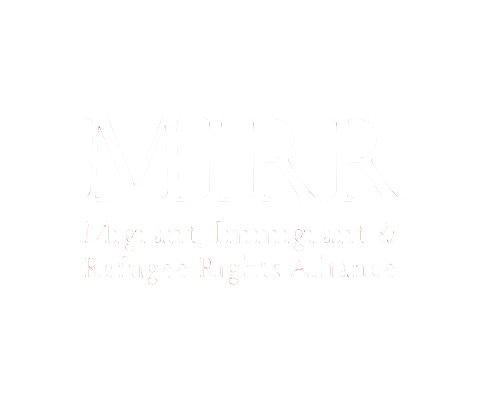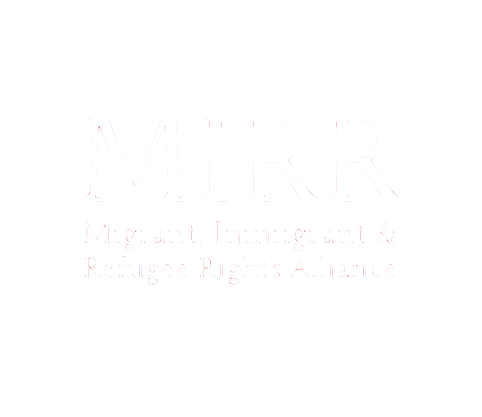MIRR Alliance joins Doctors for Camp Closure and 60+ others calling on Biden to reverse harmful immigration policies
Dear President Joseph R. Biden,
We, the undersigned organizations, are writing to you in solidarity to respectfully demand that your administration take swift executive action within your first 100 days as President of the United States to end three (3) of most egregious immigration policies still in practice in our great nation. These policies are antithetical to what the United States stands for and are causing ongoing harm to not only the immigrants and families directly affected, but to all Americans.
First, we ask that you put an immediate end to all family incarceration in the United States by closing the three remaining family detention facilities still being operated by U.S. Immigration and Customs Enforcement (ICE), with a combined capacity of 3,326 people.[1] These facilities are the South Texas Family Residential Center in Dilley, Texas, a privately owned center operated by the for-profit company CoreCivic[2] that can hold 2,400 people; Berks County Residential Center in Leesport, Pennsylvania, a county-operated 96-bed facility[3] with space for 200 people; and Karnes County Residential Center (KCRC) in Karnes City, Texas, a privately owned facility operated by the for-profit GEO Group,[4] which can hold 830 people.
The current family detention program is the largest since the internment of Japanese Americans in the 1940s.[5] Not only is the detention of families inhumane, it is also known to cause numerous adverse psychological and physical consequences to those who experience it, most notably children. The American Academy of Pediatrics (AAP) considers the detention of immigrant children to be a specific type of Adverse Childhood Experience (ACE), consequences of which include but are not limited to, increased risk of injury and sexually transmitted infections, teen pregnancy, maternal and child health problems, involvement in sex trafficking, as well as a wide range of chronic diseases and leading causes of death such as diabetes, heart disease, cancer and suicide.[6] The American College of Obstetricians and Gynecologists (ACOG) notes that “women and girls are highly vulnerable to sexual assault in immigration detention facilities.”[7] In 2019, Pennsylvania’s Auditor General opened an investigation into reports of sexual abuse, inadequate health care, and other human rights abuses in the Berks County facility,[8] underscoring the urgent need to close these centers and release the families being held in them.
Second, we ask that you create a comprehensive plan for the expeditious release from immigration detention of all people with underlying health conditions which would put them at risk of serious complications or death from continued incarceration. Detention facilities, whether they be standalone immigrant detention facilities or a part of county jails, are often crowded and unsanitary and fail to adhere to recognized standards for prevention, screening, and containment of transmittable diseases. ICE’s practice of frequently transferring people in detention from one location to another increases the risk of outbreak. For these reasons, transmission of respiratory diseases in jails and prisons is incredibly common. It is estimated that up to a quarter of the US prison population has been infected with tuberculosis,[9] with a rate of active TB infection that is 6-10 times higher than the general population.[10] Past outbreaks of mumps, influenza, and varicella have spread throughout immigration detention facilities. For example, 5 cases of mumps in September 2018 ballooned to nearly 900 cases among staff and people in detention by August 2019 in 57 facilities across 19 states.[11]
Since the start of the COVID-19 pandemic, countless detained people, as well as ICE agents and prison guards who work within detention facilities, have contracted the disease.[12] A study published in the Journal of the American Medical Association (JAMA) concluded that, based on case numbers and positivity rates, COVID-19 is escalating more rapidly inside immigration detention centers compared with the general US population.[13] This not only affects the state of this health crisis inside detention facilities, but also affects the surrounding communities of which these facilities are a part. Detained people who are at increased risk for severe illness and death from COVID-19 due to underlying health conditions place an increased burden on already strained local healthcare facilities and hospitals. For this reason, it is imperative that all medically vulnerable people being detained by ICE be immediately released while awaiting asylum claims or deportation determinations.
Third, we ask that you order an immediate end to ICE raids in American communities. We know that the constant intake of new immigrants from the larger community places detention centers at ongoing risk of COVID-19 outbreaks and increased transmission across facilities. But in addition to the effects on infectious disease spread, ongoing ICE raids in American neighborhoods and workplaces lead to adverse security, psychological and economic consequences to the people living in those communities.
It is known that community members are less likely to cooperate with local law enforcement if they fear that ICE will be notified of undocumented people in that community. In 2008, testimony given during a Congressional hearing of the Committee on Education and Labor, Subcommittee on Workforce Protections detailed how an ICE raid conducted at a meat processing plant while the Department of Labor and Iowa State officials were investigating the owner of the plant for child labor violations jeopardized the ongoing investigation and threatened to derail it completely.[14] In addition to making criminal investigations harder, ICE raids have widespread psychological impacts on members of the community, most notably children. Children of undocumented immigrants, ⅔ of whom are American citizens, who witness a parent being arrested by ICE have been found to suffer long-term psychological consequences such as depression, anxiety and even post-traumatic stress disorder (PTSD), which can affect them for the rest of their lives.[14,15] Following a 2018 ICE raid in Mt. Pleasant Iowa, a local high school soccer coach recalled, “The boys cry, and they start to beat the wall, and they asked me, ‘Tell me coach why is this happening to me? Tell me why?’” He went on to share that many of those students subsequently dropped out of school to find jobs in order to continue to support their families and younger siblings in the absence of their parents.[16] This leads to the final point which is that ICE raids also adversely affect the economies of the communities in which they take place. An American Immigration Council report found that a 2006 workplace raid in Marshalltown Iowa “contributed to a localized economic recession for perhaps six months to a year after the raid.”[17] The domino effect of a raid leads to not only hardships for the workplace in which it took place, but to a decreased local consumer base, decreased local retail sales, and increased in foreclosures on homes.[16]
The policies and practices of the former Trump administration led our great nation down a dark path of exclusion, mass incarceration, and blatant human rights violations of immigrant men, women and children. We are imploring you to take action to correct our course and work towards returning the United States to its former ideal of being a welcoming place for the world’s most vulnerable – a place where people and families can find a better life for themselves without living in fear and sickness. We urge you to use your executive power to restore these American ideals and end the ongoing suffering of so many people within our borders.
Sincerely,
Doctors for Camp Closure
Clinicians for Progressive Care
Southern Border Communities Coalition
Lawyers for Civil Rights
University of San Francisco Immigration & Deportation Defense Clinic
Tsuru For Solidarity
Fellowship of Reconciliation (FOR-USA)
Physicians for Social Responsibility/Sacramento
Manazanar Committee (Los Angeles, CA)
Alianza Sacramento
Maryland Legislative Coalition
PG Change Makers Coalition
First Unitarian Universalist Society of San Francisco
Manzanar Committee
Campaign for Immigrant Detention Reform (CIDR)
The Chicago People’s Rights Collaborative
ACLU of Maryland
SFLCLAA
St. Mark’s Lutheran Church (Sanctuary Team)
Bay Area Border Relief
Chesapeake Physicians for Social Responsibility
Medical Students for Choice
Florin Japanese American Citizens League – Sacramento Valley
San Francisco CODEPINK
Neponset Health Center Dorchester MA
Japanese American Citizens League
OWL SF
Immigrant Service Providers Group/Health
DC Volunteer Lawyers Project
Church World Service
UCSF Pediatrics Immigrant Health Task Force
The Institute for Physician Wellness
Alianza Nacional de Campesinas
Multicultural Efforts to end Sexual Assault (MESA)
Yale School of Medicine
Physicians for Human Rights
AsylumWorks
Church World Service
St. Mark’s Lutheran Church, San Francisco – Sanctuary Team
Sisterhood of Salam Shalom Silver Spring
Takoma Park Mobilization
Dignity in Asylum
National Council of Asian Pacific Islander Physicians
United We Dream
ACLU MONTGOMERY County, MD Immigrants’ Rights Subcommittee
Capital Area Immigrants’ Rights Coalition
MGB Hospital
CASA
Japanese American Citizens League Philadelphia Chapter
Tikkun Olam Chavurah
Immigration Justice Task Force – First Parish UU Concord Mass
Sanctuary DMV
Congregation Action Network
Nikkei Student Union of UC Berkeley
The Medical Providers Network (MPN) at the New York Lawyers for the Public Interest
Doctors for America, Immigrant Health Justice Working Group
Lifeundocumented.org
Never Again Action – Los Angeles
New York Lawyers for the Public Interest (NYLPI)
Migrant, Immigrant & Refugee Rights Alliance
Community for Children, Inc.
Innovation Law Lab
Bend the Arc: Jewish Action – Prince George’s County, MD
Families Belong Together
Indivisible Central Maryland
Grady
Migrant Clinicians NetworkReferences
1. United States Government Accountability Office. Immigration Detention: Opportunities Exist to Improve Cost Estimates. 2018. p. 18. Retrieved from: https://www.gao.gov/products/GAO-18-343
2. CBS News. South Texas immigration detention center set to open. 15 December 2014. Retrieved from: https://www.cbsnews.com/news/south-texas-immigration-detention-center-set-to-open/
3. McCrone BX. Inside Pa.’s ICE Immigrant Family Detention Center. NBC 10 Philadelphia. 28 July 2017. Retrieved from: https://www.nbcphiladelphia.com/news/national-international/inside-look-at-ice-berks-county-residential-center-1-million-boon-for-local-government-2/207792/
4. Garcia J and Moritz JC. Here’s where immigrant families in Texas could be housed after Trump’s executive order. Corpus Christi Caller-Times. 20 June 2018. Retrieved from https://www.caller.com/story/news/local/2018/06/20/heres-where-immigrant-families-could-housed-after-trumps-order-zero-tolerance-policy/717726002/
5. Detention Watch Network. Family Detention: The Unjust policy of locking up immigrant mothers with their children. DWN. Retrieved from: https://www.detentionwatchnetwork.org/issues/family-detention
6. Centers for Disease Control and Prevention. Adverse Childhood Experiences (ACEs). Retrieved from: https://www.cdc.gov/violenceprevention/aces/index.html
7. American College of Obstetricians and Gynecologists. Policy Report: Opposition to Immigration Practices that are Detrimental to the Health and Well-Being of Women and Children. ACOG 2018. Retrieved from: https://www.acog.org/clinical-information/policy-and-position-statements/statements-of-policy/2018/opposition-to-immigration-practices-that-are-detrimental-to-the-well-being-of-women-and-children
8. Winfrey K. Pa. auditor general to examine ICE detention center in Berks. WFMZ. 14 June 2019. Retrieved from: https://www.wfmz.com/news/area/berks/pa-auditor-general-to-examine-ice-detention-center-in-berks/article_e0b3ee3d-d598-5fa6-8a09-0da380d11a46.html
9. Hammett TM, Harmon MP, Rhodes W. The burden of infectious disease among inmates of and releases from US correctional facilities, 1997, Am J Public Health, 2002; vol. 92:1789-94.
10. Centers for Disease Control Prevention. Prevention and control of tuberculosis in correctional and detention facilities: recommendations from CDC, MMWR Morb Mortal Wkly Rep, 2006; vol. 55:1-48.
11. Leung J, Elson D, Sanders K, et al. Notes from the Field: Mumps in Detention Facilities that House Detained Migrants — United States, September 2018–August 2019. MMWR Morb Mortal Wkly Rep 2019;68:749–750. https://www.cdc.gov/mmwr/volumes/68/wr/mm6834a4.htm?s_cid=mm6834a4_x
12. Smart N and Garcia A. Tracking COVID-19 in Immigration Detention: A Dashboard of ICE Data. Vera Institute of Justice. Retrieved from: https://www.vera.org/tracking-covid-19-in-immigration-detention
13. Erfani P, Uppal N, Lee CH, Mishori R, Peeler KR. COVID-19 Testing and Cases in Immigration Detention Centers, April-August 2020. JAMA. Published online October 29, 2020. doi:10.1001/jama.2020.21473
14. Hearing before the Subcommittee on Workforce Protections; Committee on Education and Labor. U.S. House of Representatives 110th Congress, 2nd session. May 20, 2008. Retrieved from: http://www.gpoaccess.gov/congress/house/education/index.html
15. Brabeck KM, Lykes MB, Hunter C. The psychosocial impact of detention and deportation on U.S. migrant children and families. Am J Orthopsychiatry. 2014 Sep;84(5):496-505.
16. Fields S. The economic consequences of ICE raids are far reaching. Marketplace. 22 August 2019. Retrieved from: https://www.marketplace.org/2019/08/22/the-economic-consequences-of-ice-raids-are-far-reaching/
17. Flora JL, Prado-Meza CM, Lewis H. After the Raid is Over: Marshalltown, Iowa and the Consequences of Worksite Enforcement Raids. American Immigration Council, January 2011. Retrieved from: https://www.americanimmigrationcouncil.org/sites/default/files/research/Marshalltown_Raid_012511.pdf[/vc_column_text][/vc_tta_section][/vc_tta_accordion][/vc_column][/vc_row]


